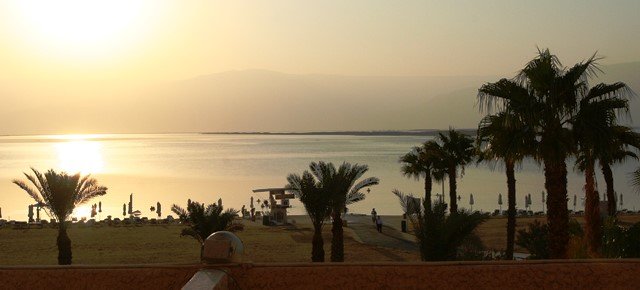Share This Story, Choose Your Platform!
On November 10, 2018, I gave a Bible study on Acts 1:6-8 on the topic of “The Kingdom for Israel” at the Third Israel Congress in Berlin/Germany. The sentence, “Every Jew who lives apart from the land of Israel, desecrates the name of God.” has elicited responses that I would like to respond to.
The prophet Ezekiel in chapter 36 draws a picture that was breathtaking for his time at the beginning of the 6th century BCE. But even a century ago, two and a half millennia after Ezekiel, it was still hard to imagine that the mountains of Israel could nourish the people of Israel returning from all over the world (verse 8).
The separation of the people and the land of Israel was so thorough that the land was described as a “man-eater” (verse 13), that is, as completely uninhabitable. Even today, many of our contemporaries regard the people of Israel returning home as “conquerors,” “colonialists,” or “occupiers.” Among Christians and Jews, the phenomenon of the reunification of the people of Israel and the land of Israel is being discussed controversially.
How it came about that the chosen people and the Promised Land were separated from each other is described by the prophet Ezekiel (chapter 36) retrospectively from verse 16. The guilt of the people had polluted the land, forcing God to dispel them among the Gentile nations all over the world.
Verse 20 describes what this separation of the chosen people from the Promised Land and their worldwide dispersal means from God’s perspective: “The people of Israel came to the Gentile nations and thus defamed the holy name of God.”
What desecrates the name of God is immediately mentioned in the second part of verse 20: “Because of them [that is, of the Jews – the gentiles] said: ‘Those are the ones who should be the people of the Lord! But they have left the land [of the Lord]!’”
The background must be understood: The first thing that was important to God in the election of Abram (Genesis 12:1) is the land that “I will show you.” Without this land, the election of the nation is unthinkable.
Rashi[1] says to Ezekiel 36:20: “They have degraded the honor of God. And what is the desecration of the name of God? That their enemies said about them: ‘They should be the people of the Lord. But they left His land. The Lord did not have the power to save His people and His land.’”
Radak[2] underlines and adds: “This is the desecration of the name of God, that the nations say of Israel that they are the people of God, they were already known as the people of God, and now they have left His land!” What a scandal! Radak goes on to show how the diaspora, the longer it lasts, the more it illustrates how powerless the God of Israel is. The gentiles say: “How could He choose them if He then rejected them and expelled them from His presence?”
A Jew in the Diaspora desecrates the name of God
Martin Luther denigrated the Jewish people and their interpretation of Scripture that was faithful to the word. Luther was only able to hold on to the credibility of Scripture by “spiritualizing” large parts of the original Word of God. The homelessness of the Jewish people, that is, the separation of the people of Israel from the land of Israel, he interpreted as an unmistakable sign of their final rejection. The German reformer was so sure of his cause that he promised to become a Jew himself should the Jews ever return to their country.[3]
Luther thought he could ridicule the Jewish people. From the point of view of anyone who takes Scripture seriously and the promises of the living God made therein, Luther’s words are a mockery of the holy name of God.
The Creator of the Universe has revealed Himself as “God of Israel” and, thus, made Himself comprehensible to humanity. He is the God who has committed Himself in a unique way to the people of Israel and the land of Israel – and, thus, to the bond between the two.
Therefore, it is an obvious sign of his powerlessness when the people of Israel live apart from the land of Israel. Therefore, it is a desecration of His holy name when gentiles realize and even mock the people of Israel living scattered throughout the world. And that is why every Jew living outside of the land of Israel defiles the holy name of the God of Israel.
A Jew in the Diaspora is a person in the grave
In chapter 37 Ezekiel goes even a step further. Here God Himself describes the repatriation of His people Israel to the land of Israel with the words: “I open your graves. I am leading you out of your graves, my people. I bring you to the ground Israel!” (verse 12).
Conversely, this means: A Jew in the Diaspora is a Jew “in the grave”, a dead, decaying or even decayed member of the people of God. Read the context of Ezekiel 37:1-14! The Prophet does not shy away from even the most disgusting image to describe the Diaspora from the perspective of God. The separation of the people of God from the land of promise is, in God’s view, a condition that can under no circumstances be permanently accepted.
Is it permissible to say something like this today?
Maybe I have to insert a personal note at this point: Some statements of the biblical texts that I am trying to explain do not seem to me to be “logical”. And in this case, what the Bible says even contradicts my very personal feelings.
I am happy about every Jewish person who lives in Germany today. Eight decades after the so-called “Kristallnacht”, when my people were so shamefully silent, and seven decades after the Shoah, whose monstrosities still leave me speechless, every Jew who speaks to me, every Jew who consciously encounters me as a German national, every Jew who chooses my German home as his abode, is a sign of reconciliation, an indication of hope, a proof that a new beginning is indeed possible.
This should never and under no circumstances ever be underestimated. This is infinitely important to me personally!
But, must I therefore keep silent, or (even worse!) re-interpret what clearly and unequivocally for millennia has been the Word of God in Scripture? How should we deal with it when the Bible states such hair-raising things?
An analogy
Perhaps an analogy may be helpful in dealing adequately with the statement of Ezekiel 36 and 37.
In Genesis 1:28 we read of the first commandment that the Creator gave mankind: “Be fruitful, multiply and fill the land!” The distinction between man and woman, their association as a couple, and the concomitant mission to bring children into the world are the first and most fundamental statement about man after they were established “in the image of God” (verse 27). The blessing of God is expressed with the explicit objective and purpose of fertility.
Only husband and wife together are a “human being”
The statements about man in the first two chapters of the Bible make it compelling that a man without a wife is “helpless” (Genesis 2:18-25). An unmarried man or a single woman are according to the statements of these texts not a complete “human being”. Only in the framework of a lifelong, exclusive connection of one male with the one female whom God has created and led him to, does a “man” arise, as the Creator has imagined.
The task of having children and being parents is so fundamental that it is compelling to conclude conversely: A person who has no offspring has failed the objective of his existence. Life without children is meaningless.
It is hardly worth mentioning that such statements can be very unpleasant in the face of unfulfilled and perhaps even unachievable wishes of a partner or children. Furthermore, the Bible clearly contradicts also in this case the standards set by the spirit and atmosphere of the 21st century.
However, those who interpret the radical nature of these biblical statements in relative terms or even disqualify them as not valid today will not be able to understand most of the biblical stories. Only on the background of the creation story and its authoritative statements about the sense and purpose of human existence does the meaning of the mothers of Israel, Sarah (Genesis 11:30), Rebekah (Genesis 25:21) and Rachel (Genesis 30:1) being barren become clear. Infertility and the consequent missing of the objective, that is, “sin”, of human existence is the theme of the Bible up to Elizabeth and Zacharias (Luke 1:7).
Likewise, what Scripture says about the land of Israel and the people of Israel cannot be understood unless the original, fundamental statements about the connection between God, His land and His people are left in their original focus.
A way for singles to be a complete “human being”
In the New Testament, Jesus and Paul open a way for single people to become complete human beings. It is noteworthy that Jesus makes his statements in Matthew 19:11-12 in the context of an explicit reference back to the validity of the original order of creation.
Paul points out that there are vocations and assignments in the Kingdom of God that only singles are able to fulfill. In view of his own lifestyle and perhaps also the celibacy of Messiah, the apostle gets carried away in the statement: “I wish they were all like me” (1 Corinthians 7:7). However, even in Pauline doctrine, the original order of creation remains untouched. The scholarly rabbi knows that it is a heresy to forbid taking a wife (1 Timothy 4:3).
Back to the question of the land
We maintain: The separation of the people of Israel from the land of Israel is, according to Scripture, a humiliation, desecration, and even blasphemy of the holy name of God. In principle, this statement should not and must not be shaken. It remains firmly established even after two and a half millennia of Jewish diaspora around the world – and demonstrates what this whole development means to our Father in Heaven.
At the same time, however, we may also discover in the biblical texts that a separation of the chosen people from the promised land has always meant a “time of grace”, an opportunity for salvation for the Gentile nations.
Diaspora of Israel as opportunity to salvation for the Gentiles
That was true of the “first diaspora” in Egypt. God told Abram, our father, that his descendants must be four hundred years strangers, “in a land that does not belong to them.” The reason for this was that God had an open account with the world power of Egypt. In a unique way, the Egyptians through Joseph had met the God of Israel, had escaped starvation with his help.
And also for the inhabitants of the land of Canaan, the bondage of the Hebrews in the land on the Nile meant an opportunity. The descendants of Abram had to leave the Promised Land and were allowed to return only after four generations, “for the iniquity of the Amorites is not yet full” (Genesis 15:13-16).
The same applies to the “second diaspora” of Israel in Babylon. The Babylonians and later the Persians were confronted with the word of God in a way, that many joined the people of God. Just read what the Bible has to say about Ezekiel, Daniel, Mordecai or Esther.
Finally, the dispersion of the Jewish people all over the world during the past two thousand years has been the “third diaspora,” a time in which the Gospel provided unique access for gentiles to the God of Israel. God had answered Abram’s question “how am I to know that I shall possess the land?” by referring to the meaning and purpose of the exile in Egypt (Genesis 15). Similarly, Jesus answers the question of his disciples about the return of the people of Israel to the land of Israel with the Great Commission (Acts 1:6-8).
The desecration of the name of God …
What it means for the Heavenly Father to give us non-Jews access to His salvation only becomes clear when we take the entire biblical testimony, all that Scripture says, seriously.
The living God sacrificed His beloved Son. Yeshua suffered a terrible death by torture on the cross for us. But that was not all. In this way, the One who was supposed to be the blessing par excellence became a curse for our sakes, so that “the blessing of Abraham could come to the gentiles” (Galatians 3:10-14). God made “the One who did not know sin at all sin for our sake so that we might become righteousness of God in Him” (2 Corinthians 5:21).
When Israel sees its Messiah today, it sees a curse – “Yeshu”, the acronym for the words “may his name and memory be extinguished”. When the Jewish people today have their Savior in mind, they see sin. Only a few Jews actually dare to verbalize in the presence of Christians what they see and feel when they hear the words “church,” “cross,” or “Christianity.”
… for our sake!
And when Paul wrote that “through the fall of Israel” “salvation has come to the gentiles” (Romans 11:11), he not only saw the breach between the Jewish people and it’s Messiah. He also saw the separation of his people from the land of Israel. And all this happened so that the redemption in the Messiah of Israel, Yeshua of Nazareth, could have its effect on the non-Jewish peoples, on the Gentiles.
To say that once more in a more personal manner: For our sake … For me, the Heavenly Father not only burdened Himself with the pain of His beloved Son on the cross, but also with the pain caused by the separation between people and Messiah, and then even the ultimate desecration of the holy name of God in front of all the nations of the world, the separation of the people and the land of Israel. To this very day (!), the Living God, suffers this extreme humiliation so that we may be saved.
Paul remained until his death the rabbinical student Sha’ul from Tarsus who was faithful to the Torah. If he wrote to non-Jews (!) about “the suffering for your sakes” by which he was fulfilling “in my flesh” “what is lacking in the tribulations of the Messiah” (Colossians 1:24), then he had these connections in mind, which specifically concerned him as Hebrew of Hebrews, as a member of the tribe of Benjamin. The suffering of his people Israel serves us non-Jews for salvation.
Not the last word!
Not even for the Apostolic Creed is the suffering, death, resurrection and ascension of Christ – and, of course, the salvation for the nations caused by them – the last word. “From there He will come again to judge the living and the dead,” it says.
Jesus knew all too well that Jerusalem would only be crushed by the Gentiles “until the times of the Gentiles are fulfilled” (Luke 21:24). And Paul declared that “a part of Israel was hardened until the fullness of the gentiles has come to salvation” (Romans 11:25).
And then?
The next step: the sanctification of the name of God
Then God will remember his holy name, “whom you have defiled among the gentiles” (Ezekiel 36:22). And He will restore the honor of His holy name. How? “I will take you from among the non-Jewish nations and gather you from all countries. I will bring you back to your earth” (Ezekiel 36:24).
Read the context of Ezekiel 36, from verse 24 to the end of the chapter – and beyond. You are taken into an exciting process. The nation of Israel is gathered from all over the world. Ultimately, God “will not leave even one of them behind” (Ezekiel 39:28). The Lord promises His people a new heart and a new spirit. There is talk of the land of the fathers, which they will inhabit, of fruit on the trees and the yield of the field, of cities that were once ruined, barren and torn down, but now firmly established and inhabited.
God does it all “not for your sake, ye of the house of Israel, but for the sake of my holy name.” This is sobering for us humans, whether we be Jews or Gentiles, that God opens a chapter that is no longer about our salvation. But that is also the reason why these promises have to be considered as irrefutable: The whole issue is about the honor of the Eternal and about all nations who will have to admit that He is Lord.
Footnotes:
[1] Rabbi Shlomo Ben Yitzchak (1040-1105) or “Rabbi Shlomo Itzchaki,” commonly called “Rashi,” was born in the northern French town of Troyes, studied for ten years in Mainz and Worms, before he returned to Troyes, where he distinguished himself as a judge and teacher. In his last years he witnessed the persecution of Jews during the Crusades. Rashi is one of the extraordinary interpreters of Jewish writings and the very first who explained the Bible and the Talmud comprehensively. His basic concerns were to bring Holy Scripture to the people, to promote the unity of the Jewish people and the theological confrontation with Christianity. Raschi made a sharp distinction between “pshat” (literal interpretation) and “drash” (allegorical interpretation), whereby the pshat gives the rash. His interpretation of Scripture has decisively shaped the reformer Martin Luther. Although his comments are still standard today, he often writes “I do not know”.
[2] Rabbi David Ben Yosef Kimchi (1160-1235), the so-called “Radak”, was the first among the great exegetes and grammarians of the Hebrew language. He was born in Narbonne, southern France. His father died early, so David was brought up by his brother Moshe Kimchi. Radak permitted philosophical studies only to those whose faith in God and the fear of heaven were firmly established. Publicly he dealt with Christians and attacked primarily their allegorical interpretation of Scripture and the theological claim to be the “true Israel”.
[3] Compare „Ein Brief D. Mart. Luther. Wider die Sabbather an einen guten Freund. 1538“, WA 50.309-327. For our context, especially the pages 323 and 324 are important, which can be viewed under https://archive.org/stream/werkekritischege50luthuoft#page/322/mode/2up (11/29/2018).






















